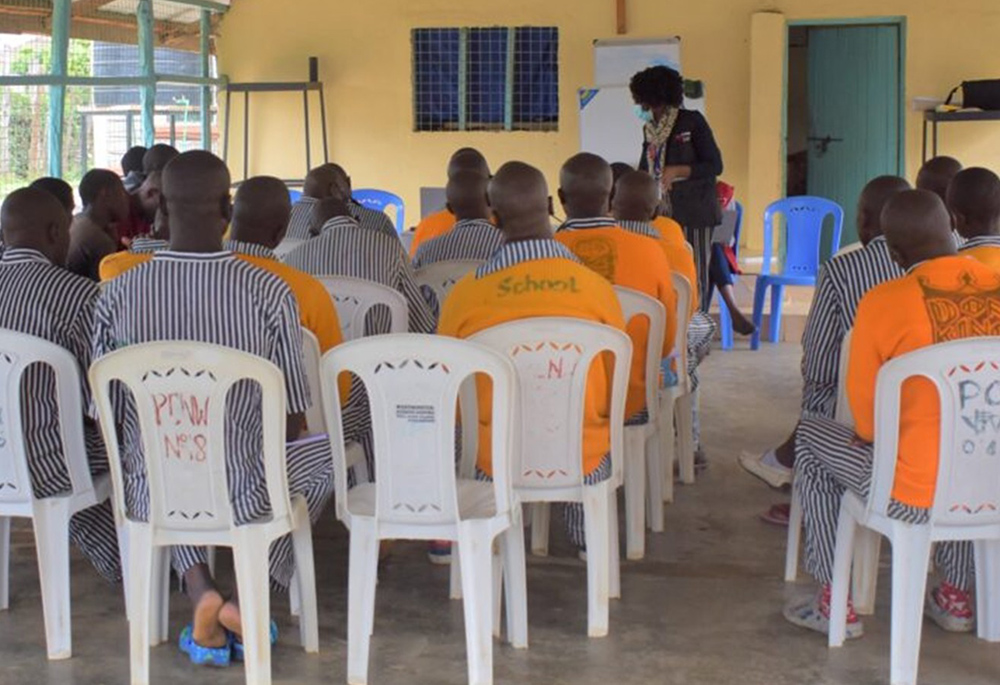
Inmates at Nairobi West Prison, listen to a presentation by legal advocates during Legal Awareness Week on Oct. 30, 2024. The annual initiative, organized by the Law Society of Kenya, promotes access to justice, legal education, and seeks to address prison congestion across the country. (Courtesy of Hedwig Muse)
On Oct. 30, 2024, I joined fellow legal advocates under the umbrella of the Law Society of Kenya, established under the Law Society of Kenya Act of 2014, for community service at Nairobi West Prison. The initiative was in response to the need for an annual Legal Awareness Week, a nationwide program focused on promoting access to justice and legal education, and addressing the persistent issue of prison congestion.
The Law Society of Kenya launched Legal Awareness Week about two years ago to offer legal support to vulnerable people in courts and prisons. This past year, advocates were selected from different regions to provide legal support across the different Law Society of Kenya branches.
I was the only Catholic sister among the group of advocates, which drew attention from many inmates — both Catholic and non-Catholic — who sought my assistance. Unfortunately, I could not attend to all of them, as their stories were lengthy and required careful listening in order to dig out the issues for legal advice. Many, however, continued to ask me to pray for them.
When we arrived at Nairobi West Prison, the deputy in charge informed us that the prison housed 557 inmates, most of whom were on remand while the rest were already sentenced. Some of the inmates had been transferred from Kamiti, a rehabilitation center.
As we began our work, inmates expressed many frustrations. Some spoke of the need for revision of bail and bond terms, emphasizing that courts are often unwilling to grant bond pending appeal. Others pointed out that the president has failed to make use of the power of mercy under the Kenyan constitution.
This, they said, contributes to prison congestion and denies inmates who merit the power of mercy the possibility of release. They requested that the Law Society of Kenya follow up on these issues and devise ways whereby inmates can have their matters resolved.
Throughout the week, we listened to other complaints. According to the inmates, most of them had been sentenced without fully understanding their cases, therefore facing unfair judgment. Upon arrest, they are charged to appear in court as accused persons until judgment. They should be informed about the trial process from the moment they enter the police station.
Some complained of long stays in remand because the complainants do not appear, and consequently the courts keep adjourning their cases. Because they do not know how to seek legal support, they fail to navigate the system.
Our mission during this specific week was to teach them how to navigate the legal system. Our presence among the inmates provided an opportunity to understand alternative sentencing options, such as plea bargaining, restorative justice, probation, community service, and diversion programs. Learning about these alternatives offers the potential to reduce the number of people going through the prison system.
Currently, a growing number of cases are being brought before the Kenyan courts, and because of poor processes, overcrowding has become a serious issue. Our visits made us aware of the challenges caused by the overcrowding of correctional facilities. Hearing from inmates about these conditions showed us the urgent need to protect the rights of incarcerated individuals and the underprivileged public. Thus, the Law Society of Kenya felt compelled to embark on a crucial mission to facilitate criminal justice reforms.
Advertisement
Part of this mission includes pretrial reforms, such as bail policies and speedy trials which would prevent individuals from spending prolonged periods in prison before their cases are resolved. These reforms would promote the rights of prisoners and, in turn, could potentially decongest the nation's prisons. Any successful criminal justice reform will necessarily require collaboration with government agencies, civil society organizations, and legal professionals to gather data, technical expertise, resources, and operational support.
Because many members of the public are unaware of how the legal system works, during this Legal Awareness Week, our various organizations were given the opportunity to showcase our services and raise awareness about pro bono legal aid. Our hope was also to help the public understand law processes that would advance the rule of law and uphold the Kenyan constitution. Our educational sessions included various aspects of civic education, as well as civic, criminal and family/probate law. The deputy prison officer remarked, "I credit the lawyers for their commitment to giving back to society without any charges," noting that legal services provided during Legal Awareness Week are a chance for the community to receive quality legal advice at no cost.
After the week of being in the prison and listening to the inmates and the issues they raised, we made the following recommendations to advance reform:
- Collaborative commitment: emphasize the importance of collaboration between government, civil society and faith-based organizations to promote justice;
- Alternative sentencing: recognize the critical role of alternative sentencing methods in reducing the number of nonviolent offenders entering prisons. These include plea bargaining, diversion, community service, restorative justice, and probation;
- Legal aid and access to justice: increase access to free legal consultations and assistance to individuals to navigate the legal system. Doing so could help reduce the number of individuals entering the prison system;
- Advocacy for pretrial reforms: promote advocacy efforts to improve pretrial detention procedures, including bail reform and speedy trials, to avoid prolonged remand periods;
- Community sensitization: encourage stakeholder engagement through community sensitization forums — a strategy backed by the United Nations Development Programme and other partners — to raise public awareness on legal matters;
- Monitoring and evaluation: establish regular monitoring and evaluation mechanisms to track progress, identify challenges and adapt strategies as needed. Continuous assessment is integral to achieving long-term reform goals.
Overall, we learned a lot about the prison system and the need for reform. The prison community often expressed their gratitude for the legal support we provided as advocates and members of the Law Society of Kenya.





